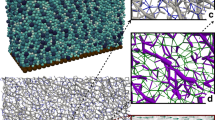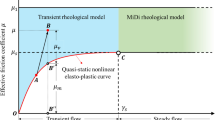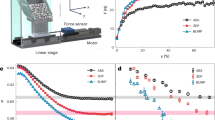Abstract
INSTRUMENTS normally used for measuring viscosity are used from time to time for studying the flow properties of granular materials, especially rotational viscometers. Wieghardt1 used, for sand, a large rotating cylindrical vessel, and measured the torque on a partly immersed long, smooth metal cylinder of small diameter. Benarie2, working with powders, made use of an ordinary visco-meter with a rotating bob, which had radially arranged baffles to avoid slippage. Kuno and Kurihara3 in similar work used a MacMichael viscometer, rotating the outer cylinder, which also had baffles.
This is a preview of subscription content, access via your institution
Access options
Subscribe to this journal
Receive 51 print issues and online access
$199.00 per year
only $3.90 per issue
Buy this article
- Purchase on Springer Link
- Instant access to full article PDF
Prices may be subject to local taxes which are calculated during checkout
Similar content being viewed by others
References
Wieghardt, K., Ingenieur-Archiv, 20, 109 (1952).
Benarie, M. M., Brit. J. App. Phys., 12, 514 (1961).
Kuno, H., and Kurihara, K., Rheol. Acta, 4, 73 (1965).
Author information
Authors and Affiliations
Rights and permissions
About this article
Cite this article
RUTGERS, R. Rheological Behaviour of Granular Material. Nature 209, 391–392 (1966). https://doi.org/10.1038/209391b0
Issue Date:
DOI: https://doi.org/10.1038/209391b0
Comments
By submitting a comment you agree to abide by our Terms and Community Guidelines. If you find something abusive or that does not comply with our terms or guidelines please flag it as inappropriate.



